Investigating Breastfeeding Practices of Migrant Women in England
VerifiedAdded on 2023/01/12
|32
|7902
|2
Report
AI Summary
This report critically investigates the breastfeeding practices of migrant women, focusing on factors influencing these practices in England, infant feeding methods, and the challenges faced by migrant women. The research explores the impact of sociodemographic and behavioral factors, as well as the influence of social support and cultural norms. The report highlights conflicts such as tensions during breastfeeding, lack of knowledge, and misconceptions about formula feeding. Through a qualitative research approach, including both primary and secondary data, the study aims to identify effective recommendation strategies for more significant breastfeeding practices, emphasizing the importance of education, support, and addressing the unique needs of migrant mothers to improve both maternal and infant health outcomes. The study concludes with recommendations for healthcare practitioners and organizations to enhance breastfeeding practices among migrant women.
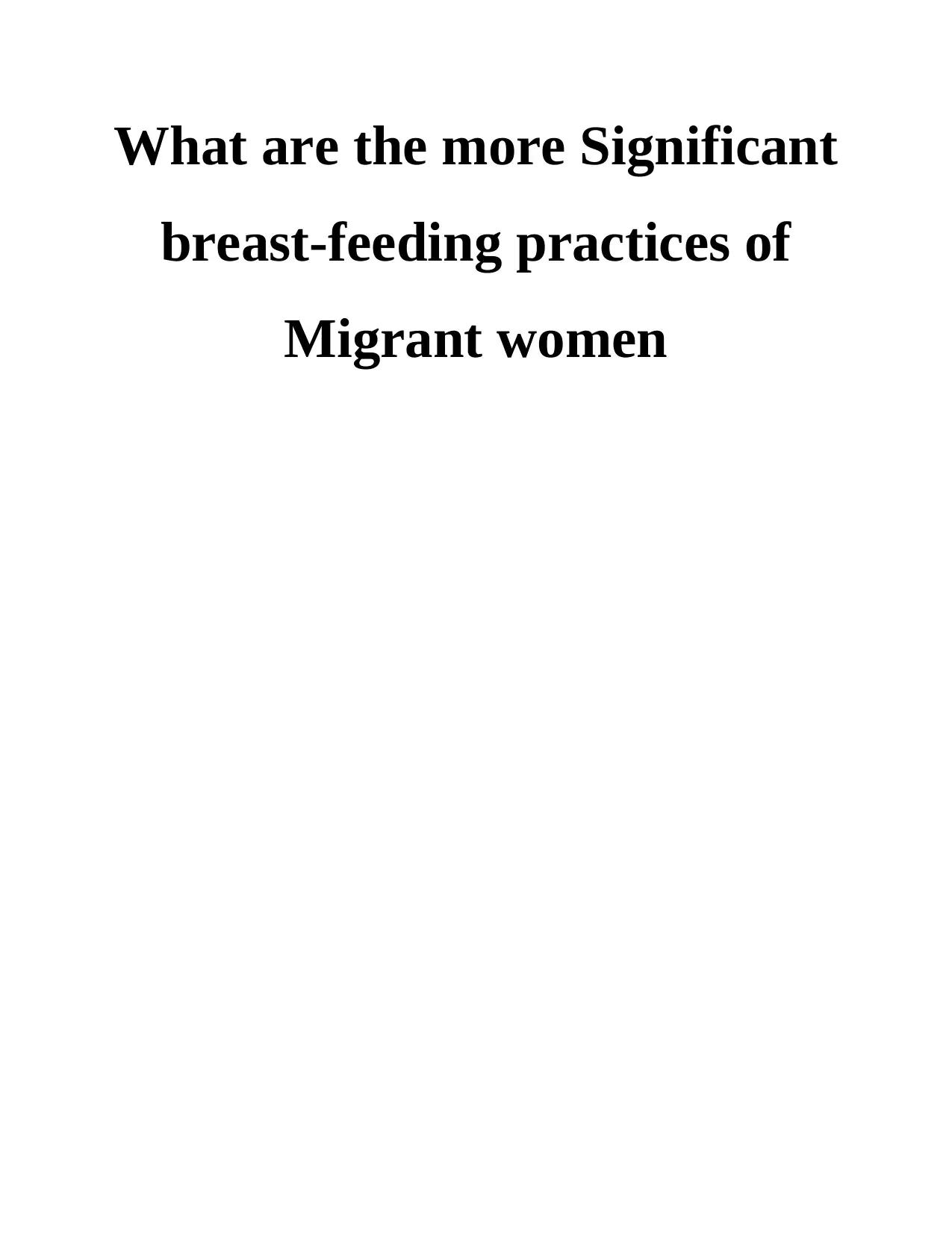
What are the more Significant
breast-feeding practices of
Migrant women
breast-feeding practices of
Migrant women
Paraphrase This Document
Need a fresh take? Get an instant paraphrase of this document with our AI Paraphraser
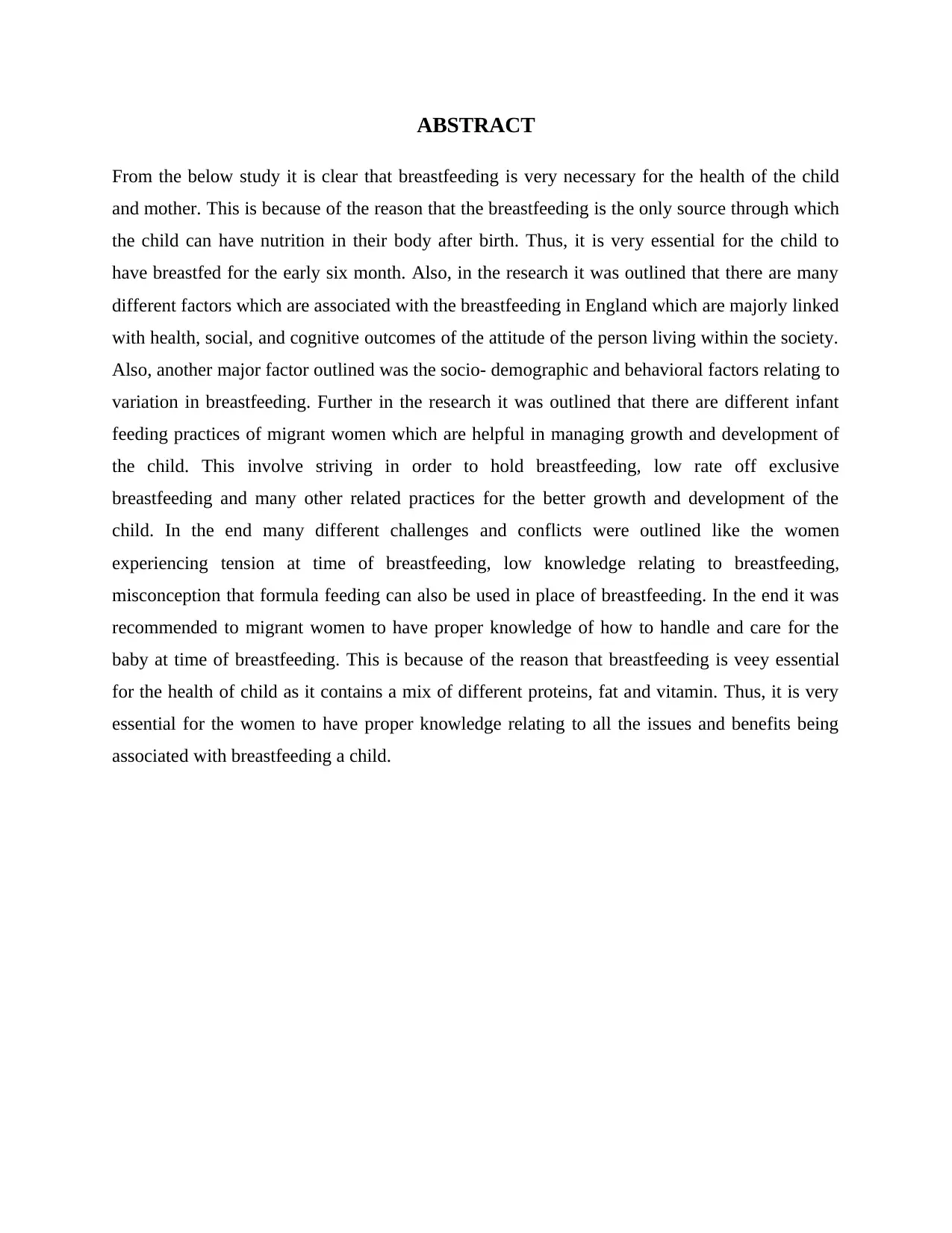
ABSTRACT
From the below study it is clear that breastfeeding is very necessary for the health of the child
and mother. This is because of the reason that the breastfeeding is the only source through which
the child can have nutrition in their body after birth. Thus, it is very essential for the child to
have breastfed for the early six month. Also, in the research it was outlined that there are many
different factors which are associated with the breastfeeding in England which are majorly linked
with health, social, and cognitive outcomes of the attitude of the person living within the society.
Also, another major factor outlined was the socio- demographic and behavioral factors relating to
variation in breastfeeding. Further in the research it was outlined that there are different infant
feeding practices of migrant women which are helpful in managing growth and development of
the child. This involve striving in order to hold breastfeeding, low rate off exclusive
breastfeeding and many other related practices for the better growth and development of the
child. In the end many different challenges and conflicts were outlined like the women
experiencing tension at time of breastfeeding, low knowledge relating to breastfeeding,
misconception that formula feeding can also be used in place of breastfeeding. In the end it was
recommended to migrant women to have proper knowledge of how to handle and care for the
baby at time of breastfeeding. This is because of the reason that breastfeeding is veey essential
for the health of child as it contains a mix of different proteins, fat and vitamin. Thus, it is very
essential for the women to have proper knowledge relating to all the issues and benefits being
associated with breastfeeding a child.
From the below study it is clear that breastfeeding is very necessary for the health of the child
and mother. This is because of the reason that the breastfeeding is the only source through which
the child can have nutrition in their body after birth. Thus, it is very essential for the child to
have breastfed for the early six month. Also, in the research it was outlined that there are many
different factors which are associated with the breastfeeding in England which are majorly linked
with health, social, and cognitive outcomes of the attitude of the person living within the society.
Also, another major factor outlined was the socio- demographic and behavioral factors relating to
variation in breastfeeding. Further in the research it was outlined that there are different infant
feeding practices of migrant women which are helpful in managing growth and development of
the child. This involve striving in order to hold breastfeeding, low rate off exclusive
breastfeeding and many other related practices for the better growth and development of the
child. In the end many different challenges and conflicts were outlined like the women
experiencing tension at time of breastfeeding, low knowledge relating to breastfeeding,
misconception that formula feeding can also be used in place of breastfeeding. In the end it was
recommended to migrant women to have proper knowledge of how to handle and care for the
baby at time of breastfeeding. This is because of the reason that breastfeeding is veey essential
for the health of child as it contains a mix of different proteins, fat and vitamin. Thus, it is very
essential for the women to have proper knowledge relating to all the issues and benefits being
associated with breastfeeding a child.
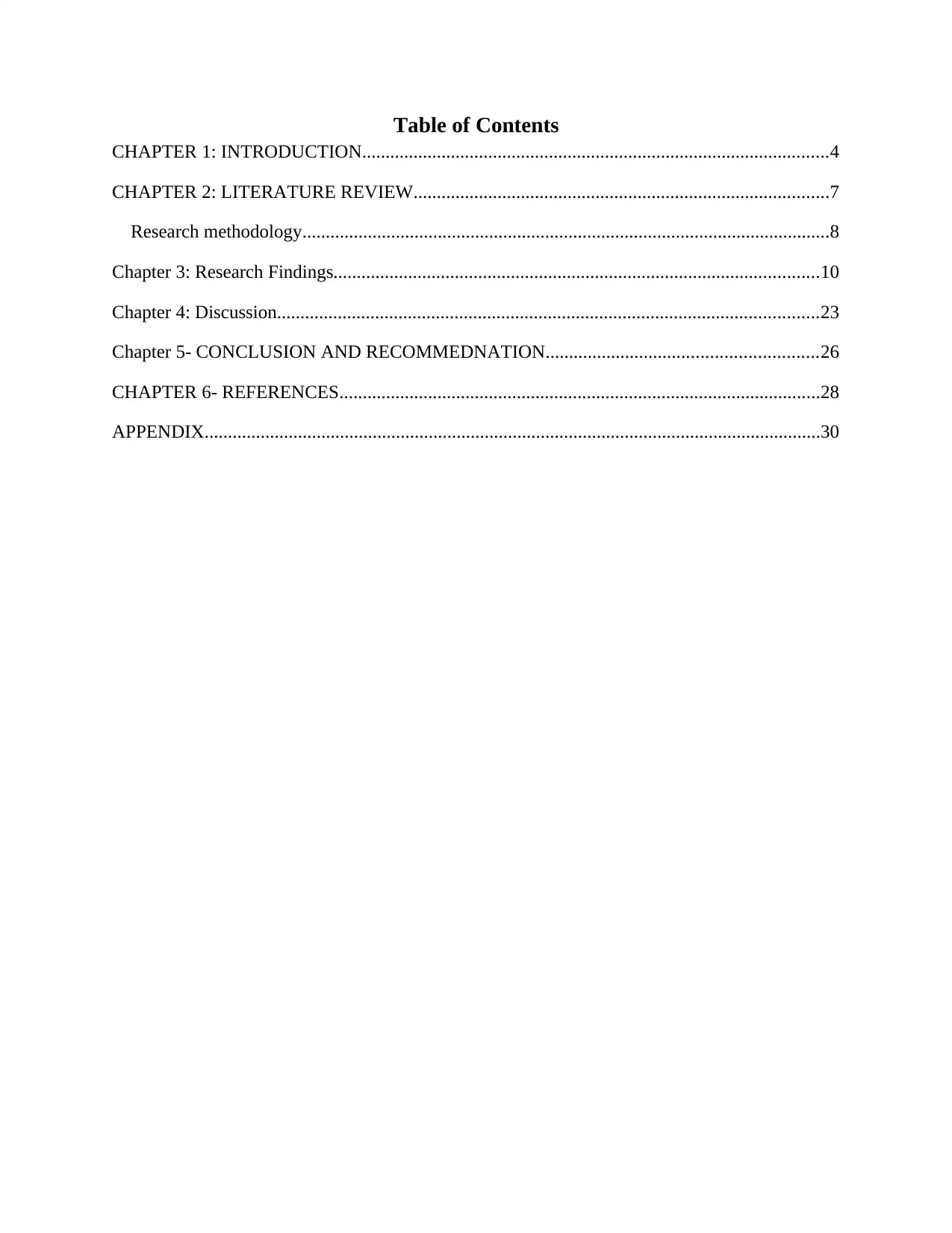
Table of Contents
CHAPTER 1: INTRODUCTION....................................................................................................4
CHAPTER 2: LITERATURE REVIEW.........................................................................................7
Research methodology.................................................................................................................8
Chapter 3: Research Findings........................................................................................................10
Chapter 4: Discussion....................................................................................................................23
Chapter 5- CONCLUSION AND RECOMMEDNATION..........................................................26
CHAPTER 6- REFERENCES.......................................................................................................28
APPENDIX....................................................................................................................................30
CHAPTER 1: INTRODUCTION....................................................................................................4
CHAPTER 2: LITERATURE REVIEW.........................................................................................7
Research methodology.................................................................................................................8
Chapter 3: Research Findings........................................................................................................10
Chapter 4: Discussion....................................................................................................................23
Chapter 5- CONCLUSION AND RECOMMEDNATION..........................................................26
CHAPTER 6- REFERENCES.......................................................................................................28
APPENDIX....................................................................................................................................30
⊘ This is a preview!⊘
Do you want full access?
Subscribe today to unlock all pages.

Trusted by 1+ million students worldwide
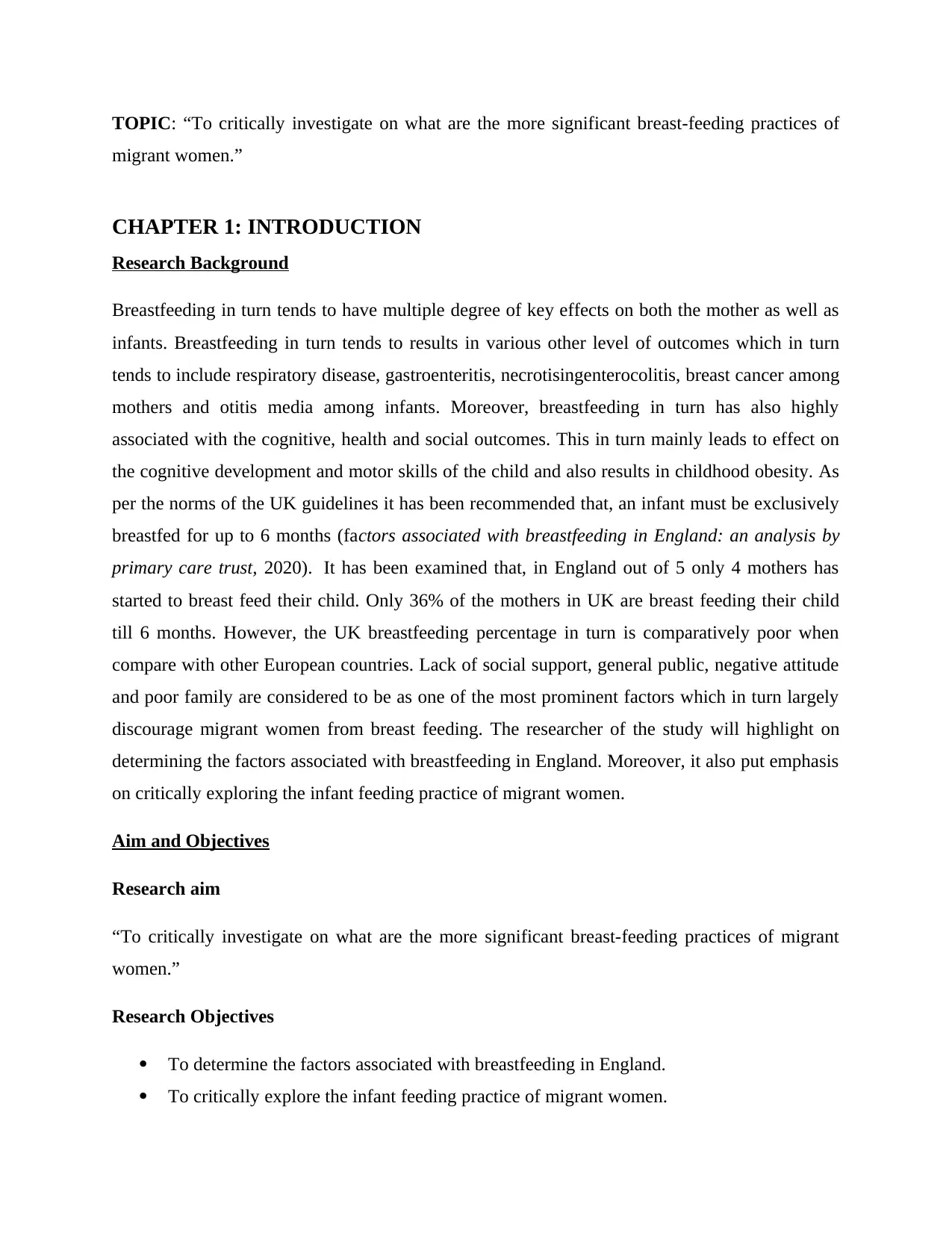
TOPIC: “To critically investigate on what are the more significant breast-feeding practices of
migrant women.”
CHAPTER 1: INTRODUCTION
Research Background
Breastfeeding in turn tends to have multiple degree of key effects on both the mother as well as
infants. Breastfeeding in turn tends to results in various other level of outcomes which in turn
tends to include respiratory disease, gastroenteritis, necrotisingenterocolitis, breast cancer among
mothers and otitis media among infants. Moreover, breastfeeding in turn has also highly
associated with the cognitive, health and social outcomes. This in turn mainly leads to effect on
the cognitive development and motor skills of the child and also results in childhood obesity. As
per the norms of the UK guidelines it has been recommended that, an infant must be exclusively
breastfed for up to 6 months (factors associated with breastfeeding in England: an analysis by
primary care trust, 2020). It has been examined that, in England out of 5 only 4 mothers has
started to breast feed their child. Only 36% of the mothers in UK are breast feeding their child
till 6 months. However, the UK breastfeeding percentage in turn is comparatively poor when
compare with other European countries. Lack of social support, general public, negative attitude
and poor family are considered to be as one of the most prominent factors which in turn largely
discourage migrant women from breast feeding. The researcher of the study will highlight on
determining the factors associated with breastfeeding in England. Moreover, it also put emphasis
on critically exploring the infant feeding practice of migrant women.
Aim and Objectives
Research aim
“To critically investigate on what are the more significant breast-feeding practices of migrant
women.”
Research Objectives
To determine the factors associated with breastfeeding in England.
To critically explore the infant feeding practice of migrant women.
migrant women.”
CHAPTER 1: INTRODUCTION
Research Background
Breastfeeding in turn tends to have multiple degree of key effects on both the mother as well as
infants. Breastfeeding in turn tends to results in various other level of outcomes which in turn
tends to include respiratory disease, gastroenteritis, necrotisingenterocolitis, breast cancer among
mothers and otitis media among infants. Moreover, breastfeeding in turn has also highly
associated with the cognitive, health and social outcomes. This in turn mainly leads to effect on
the cognitive development and motor skills of the child and also results in childhood obesity. As
per the norms of the UK guidelines it has been recommended that, an infant must be exclusively
breastfed for up to 6 months (factors associated with breastfeeding in England: an analysis by
primary care trust, 2020). It has been examined that, in England out of 5 only 4 mothers has
started to breast feed their child. Only 36% of the mothers in UK are breast feeding their child
till 6 months. However, the UK breastfeeding percentage in turn is comparatively poor when
compare with other European countries. Lack of social support, general public, negative attitude
and poor family are considered to be as one of the most prominent factors which in turn largely
discourage migrant women from breast feeding. The researcher of the study will highlight on
determining the factors associated with breastfeeding in England. Moreover, it also put emphasis
on critically exploring the infant feeding practice of migrant women.
Aim and Objectives
Research aim
“To critically investigate on what are the more significant breast-feeding practices of migrant
women.”
Research Objectives
To determine the factors associated with breastfeeding in England.
To critically explore the infant feeding practice of migrant women.
Paraphrase This Document
Need a fresh take? Get an instant paraphrase of this document with our AI Paraphraser
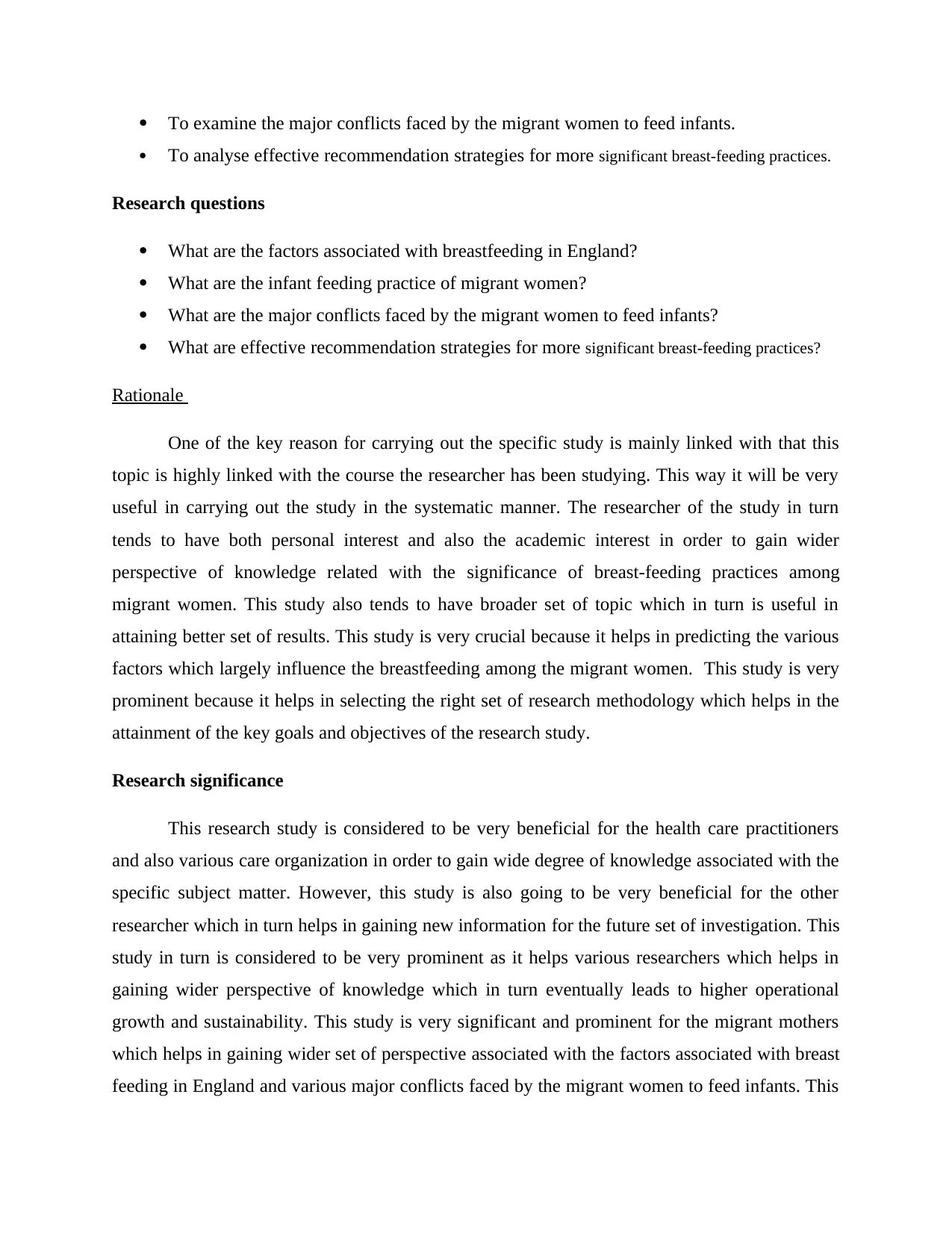
To examine the major conflicts faced by the migrant women to feed infants.
To analyse effective recommendation strategies for more significant breast-feeding practices.
Research questions
What are the factors associated with breastfeeding in England?
What are the infant feeding practice of migrant women?
What are the major conflicts faced by the migrant women to feed infants?
What are effective recommendation strategies for more significant breast-feeding practices?
Rationale
One of the key reason for carrying out the specific study is mainly linked with that this
topic is highly linked with the course the researcher has been studying. This way it will be very
useful in carrying out the study in the systematic manner. The researcher of the study in turn
tends to have both personal interest and also the academic interest in order to gain wider
perspective of knowledge related with the significance of breast-feeding practices among
migrant women. This study also tends to have broader set of topic which in turn is useful in
attaining better set of results. This study is very crucial because it helps in predicting the various
factors which largely influence the breastfeeding among the migrant women. This study is very
prominent because it helps in selecting the right set of research methodology which helps in the
attainment of the key goals and objectives of the research study.
Research significance
This research study is considered to be very beneficial for the health care practitioners
and also various care organization in order to gain wide degree of knowledge associated with the
specific subject matter. However, this study is also going to be very beneficial for the other
researcher which in turn helps in gaining new information for the future set of investigation. This
study in turn is considered to be very prominent as it helps various researchers which helps in
gaining wider perspective of knowledge which in turn eventually leads to higher operational
growth and sustainability. This study is very significant and prominent for the migrant mothers
which helps in gaining wider set of perspective associated with the factors associated with breast
feeding in England and various major conflicts faced by the migrant women to feed infants. This
To analyse effective recommendation strategies for more significant breast-feeding practices.
Research questions
What are the factors associated with breastfeeding in England?
What are the infant feeding practice of migrant women?
What are the major conflicts faced by the migrant women to feed infants?
What are effective recommendation strategies for more significant breast-feeding practices?
Rationale
One of the key reason for carrying out the specific study is mainly linked with that this
topic is highly linked with the course the researcher has been studying. This way it will be very
useful in carrying out the study in the systematic manner. The researcher of the study in turn
tends to have both personal interest and also the academic interest in order to gain wider
perspective of knowledge related with the significance of breast-feeding practices among
migrant women. This study also tends to have broader set of topic which in turn is useful in
attaining better set of results. This study is very crucial because it helps in predicting the various
factors which largely influence the breastfeeding among the migrant women. This study is very
prominent because it helps in selecting the right set of research methodology which helps in the
attainment of the key goals and objectives of the research study.
Research significance
This research study is considered to be very beneficial for the health care practitioners
and also various care organization in order to gain wide degree of knowledge associated with the
specific subject matter. However, this study is also going to be very beneficial for the other
researcher which in turn helps in gaining new information for the future set of investigation. This
study in turn is considered to be very prominent as it helps various researchers which helps in
gaining wider perspective of knowledge which in turn eventually leads to higher operational
growth and sustainability. This study is very significant and prominent for the migrant mothers
which helps in gaining wider set of perspective associated with the factors associated with breast
feeding in England and various major conflicts faced by the migrant women to feed infants. This
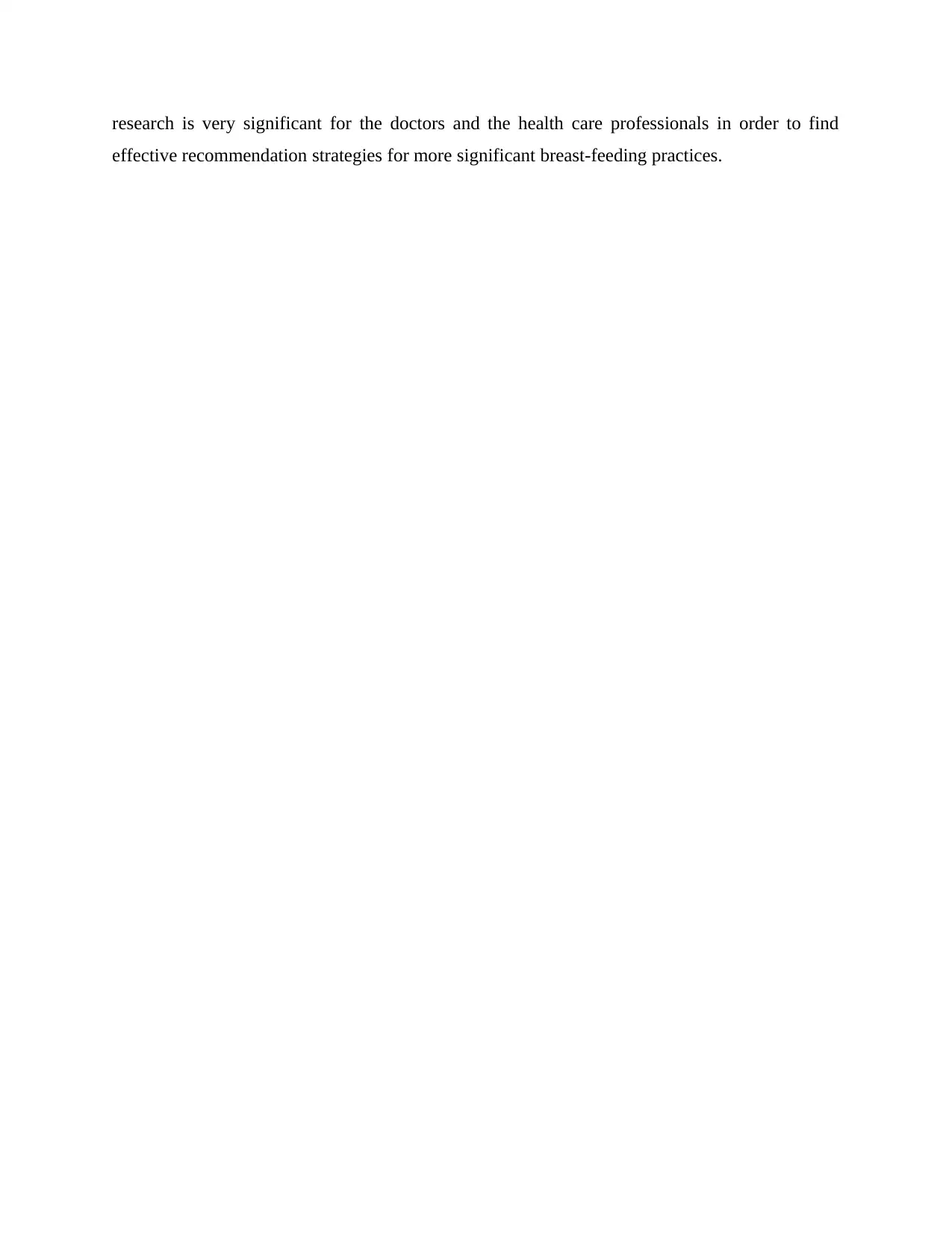
research is very significant for the doctors and the health care professionals in order to find
effective recommendation strategies for more significant breast-feeding practices.
effective recommendation strategies for more significant breast-feeding practices.
⊘ This is a preview!⊘
Do you want full access?
Subscribe today to unlock all pages.

Trusted by 1+ million students worldwide
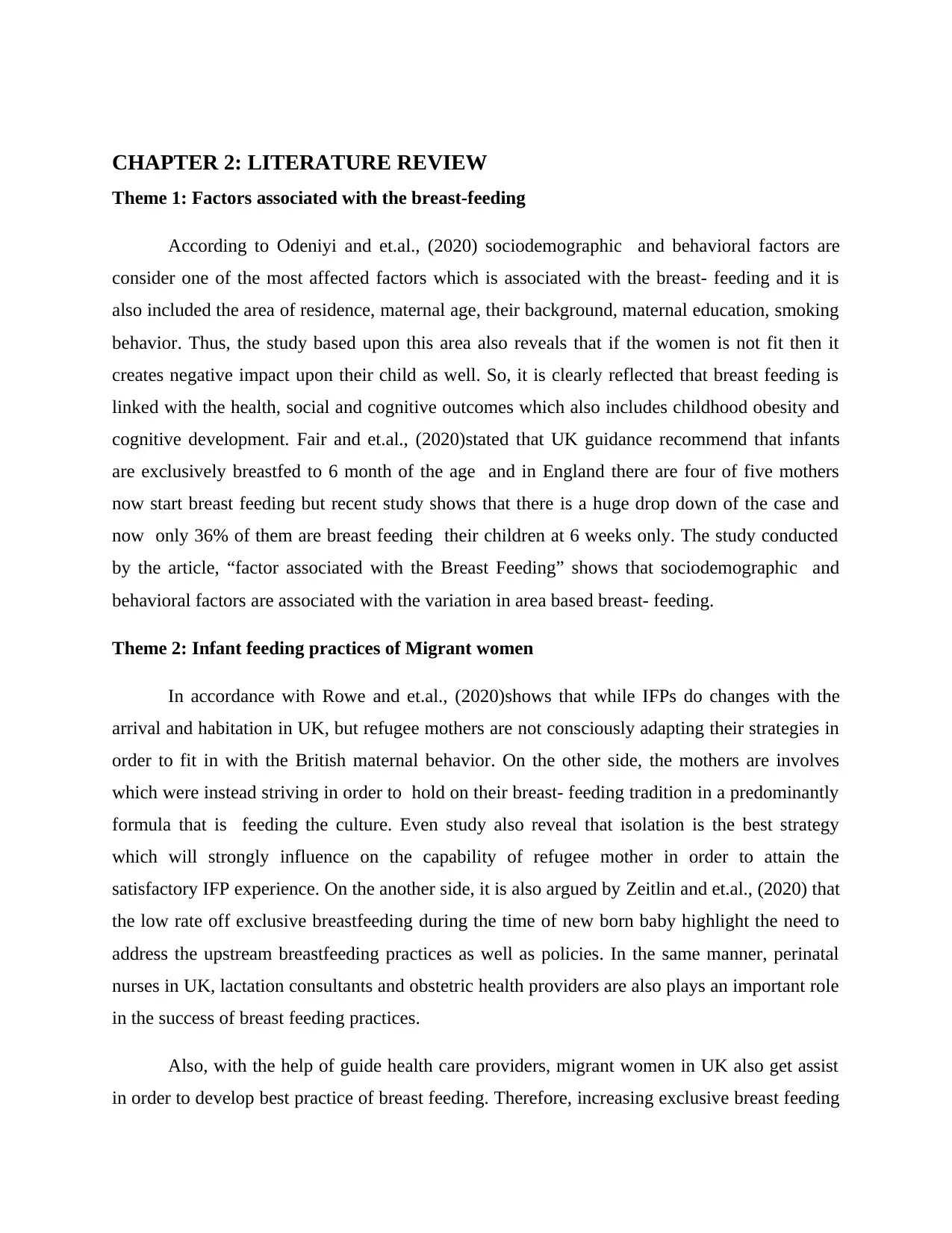
CHAPTER 2: LITERATURE REVIEW
Theme 1: Factors associated with the breast-feeding
According to Odeniyi and et.al., (2020) sociodemographic and behavioral factors are
consider one of the most affected factors which is associated with the breast- feeding and it is
also included the area of residence, maternal age, their background, maternal education, smoking
behavior. Thus, the study based upon this area also reveals that if the women is not fit then it
creates negative impact upon their child as well. So, it is clearly reflected that breast feeding is
linked with the health, social and cognitive outcomes which also includes childhood obesity and
cognitive development. Fair and et.al., (2020)stated that UK guidance recommend that infants
are exclusively breastfed to 6 month of the age and in England there are four of five mothers
now start breast feeding but recent study shows that there is a huge drop down of the case and
now only 36% of them are breast feeding their children at 6 weeks only. The study conducted
by the article, “factor associated with the Breast Feeding” shows that sociodemographic and
behavioral factors are associated with the variation in area based breast- feeding.
Theme 2: Infant feeding practices of Migrant women
In accordance with Rowe and et.al., (2020)shows that while IFPs do changes with the
arrival and habitation in UK, but refugee mothers are not consciously adapting their strategies in
order to fit in with the British maternal behavior. On the other side, the mothers are involves
which were instead striving in order to hold on their breast- feeding tradition in a predominantly
formula that is feeding the culture. Even study also reveal that isolation is the best strategy
which will strongly influence on the capability of refugee mother in order to attain the
satisfactory IFP experience. On the another side, it is also argued by Zeitlin and et.al., (2020) that
the low rate off exclusive breastfeeding during the time of new born baby highlight the need to
address the upstream breastfeeding practices as well as policies. In the same manner, perinatal
nurses in UK, lactation consultants and obstetric health providers are also plays an important role
in the success of breast feeding practices.
Also, with the help of guide health care providers, migrant women in UK also get assist
in order to develop best practice of breast feeding. Therefore, increasing exclusive breast feeding
Theme 1: Factors associated with the breast-feeding
According to Odeniyi and et.al., (2020) sociodemographic and behavioral factors are
consider one of the most affected factors which is associated with the breast- feeding and it is
also included the area of residence, maternal age, their background, maternal education, smoking
behavior. Thus, the study based upon this area also reveals that if the women is not fit then it
creates negative impact upon their child as well. So, it is clearly reflected that breast feeding is
linked with the health, social and cognitive outcomes which also includes childhood obesity and
cognitive development. Fair and et.al., (2020)stated that UK guidance recommend that infants
are exclusively breastfed to 6 month of the age and in England there are four of five mothers
now start breast feeding but recent study shows that there is a huge drop down of the case and
now only 36% of them are breast feeding their children at 6 weeks only. The study conducted
by the article, “factor associated with the Breast Feeding” shows that sociodemographic and
behavioral factors are associated with the variation in area based breast- feeding.
Theme 2: Infant feeding practices of Migrant women
In accordance with Rowe and et.al., (2020)shows that while IFPs do changes with the
arrival and habitation in UK, but refugee mothers are not consciously adapting their strategies in
order to fit in with the British maternal behavior. On the other side, the mothers are involves
which were instead striving in order to hold on their breast- feeding tradition in a predominantly
formula that is feeding the culture. Even study also reveal that isolation is the best strategy
which will strongly influence on the capability of refugee mother in order to attain the
satisfactory IFP experience. On the another side, it is also argued by Zeitlin and et.al., (2020) that
the low rate off exclusive breastfeeding during the time of new born baby highlight the need to
address the upstream breastfeeding practices as well as policies. In the same manner, perinatal
nurses in UK, lactation consultants and obstetric health providers are also plays an important role
in the success of breast feeding practices.
Also, with the help of guide health care providers, migrant women in UK also get assist
in order to develop best practice of breast feeding. Therefore, increasing exclusive breast feeding
Paraphrase This Document
Need a fresh take? Get an instant paraphrase of this document with our AI Paraphraser
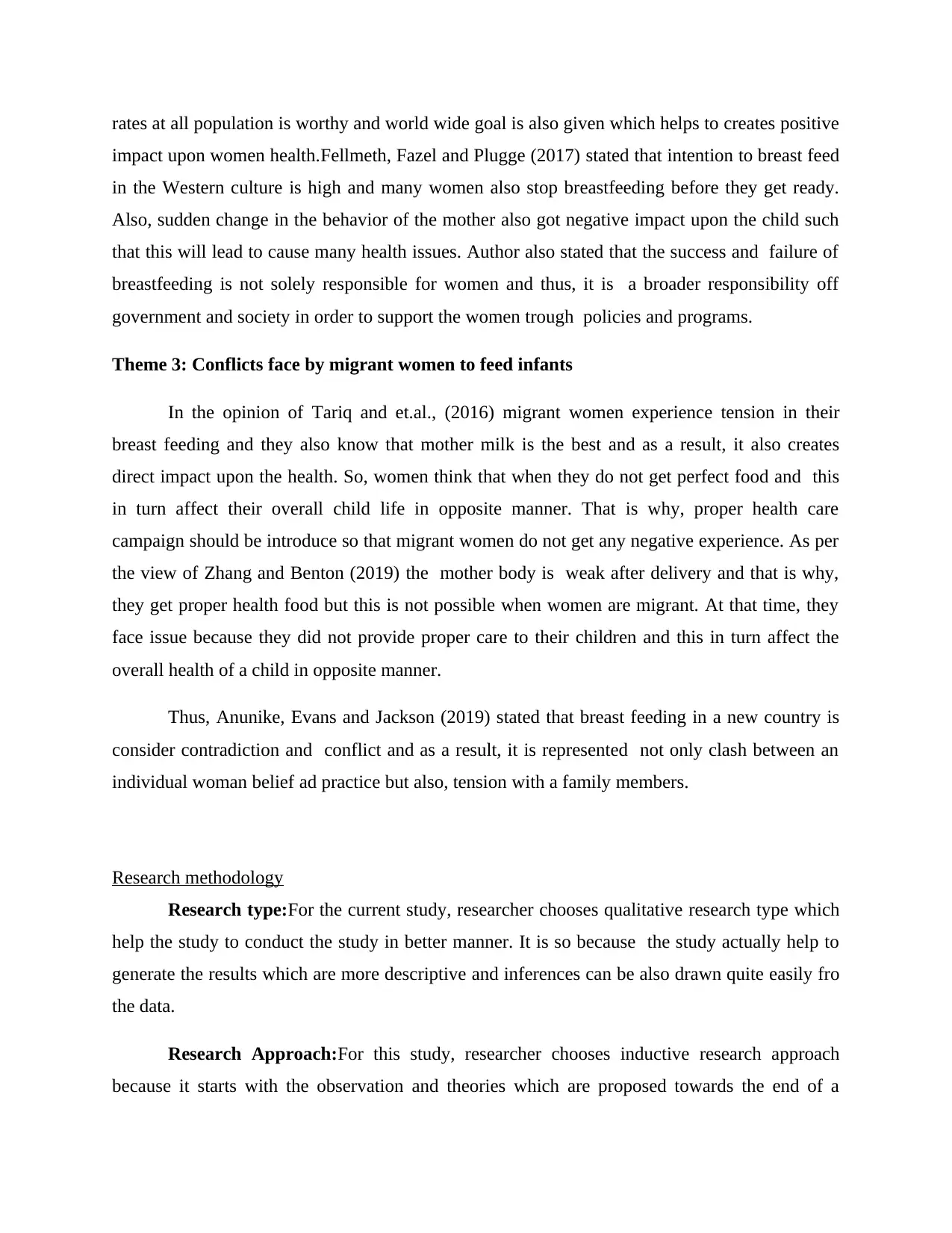
rates at all population is worthy and world wide goal is also given which helps to creates positive
impact upon women health.Fellmeth, Fazel and Plugge (2017) stated that intention to breast feed
in the Western culture is high and many women also stop breastfeeding before they get ready.
Also, sudden change in the behavior of the mother also got negative impact upon the child such
that this will lead to cause many health issues. Author also stated that the success and failure of
breastfeeding is not solely responsible for women and thus, it is a broader responsibility off
government and society in order to support the women trough policies and programs.
Theme 3: Conflicts face by migrant women to feed infants
In the opinion of Tariq and et.al., (2016) migrant women experience tension in their
breast feeding and they also know that mother milk is the best and as a result, it also creates
direct impact upon the health. So, women think that when they do not get perfect food and this
in turn affect their overall child life in opposite manner. That is why, proper health care
campaign should be introduce so that migrant women do not get any negative experience. As per
the view of Zhang and Benton (2019) the mother body is weak after delivery and that is why,
they get proper health food but this is not possible when women are migrant. At that time, they
face issue because they did not provide proper care to their children and this in turn affect the
overall health of a child in opposite manner.
Thus, Anunike, Evans and Jackson (2019) stated that breast feeding in a new country is
consider contradiction and conflict and as a result, it is represented not only clash between an
individual woman belief ad practice but also, tension with a family members.
Research methodology
Research type:For the current study, researcher chooses qualitative research type which
help the study to conduct the study in better manner. It is so because the study actually help to
generate the results which are more descriptive and inferences can be also drawn quite easily fro
the data.
Research Approach:For this study, researcher chooses inductive research approach
because it starts with the observation and theories which are proposed towards the end of a
impact upon women health.Fellmeth, Fazel and Plugge (2017) stated that intention to breast feed
in the Western culture is high and many women also stop breastfeeding before they get ready.
Also, sudden change in the behavior of the mother also got negative impact upon the child such
that this will lead to cause many health issues. Author also stated that the success and failure of
breastfeeding is not solely responsible for women and thus, it is a broader responsibility off
government and society in order to support the women trough policies and programs.
Theme 3: Conflicts face by migrant women to feed infants
In the opinion of Tariq and et.al., (2016) migrant women experience tension in their
breast feeding and they also know that mother milk is the best and as a result, it also creates
direct impact upon the health. So, women think that when they do not get perfect food and this
in turn affect their overall child life in opposite manner. That is why, proper health care
campaign should be introduce so that migrant women do not get any negative experience. As per
the view of Zhang and Benton (2019) the mother body is weak after delivery and that is why,
they get proper health food but this is not possible when women are migrant. At that time, they
face issue because they did not provide proper care to their children and this in turn affect the
overall health of a child in opposite manner.
Thus, Anunike, Evans and Jackson (2019) stated that breast feeding in a new country is
consider contradiction and conflict and as a result, it is represented not only clash between an
individual woman belief ad practice but also, tension with a family members.
Research methodology
Research type:For the current study, researcher chooses qualitative research type which
help the study to conduct the study in better manner. It is so because the study actually help to
generate the results which are more descriptive and inferences can be also drawn quite easily fro
the data.
Research Approach:For this study, researcher chooses inductive research approach
because it starts with the observation and theories which are proposed towards the end of a
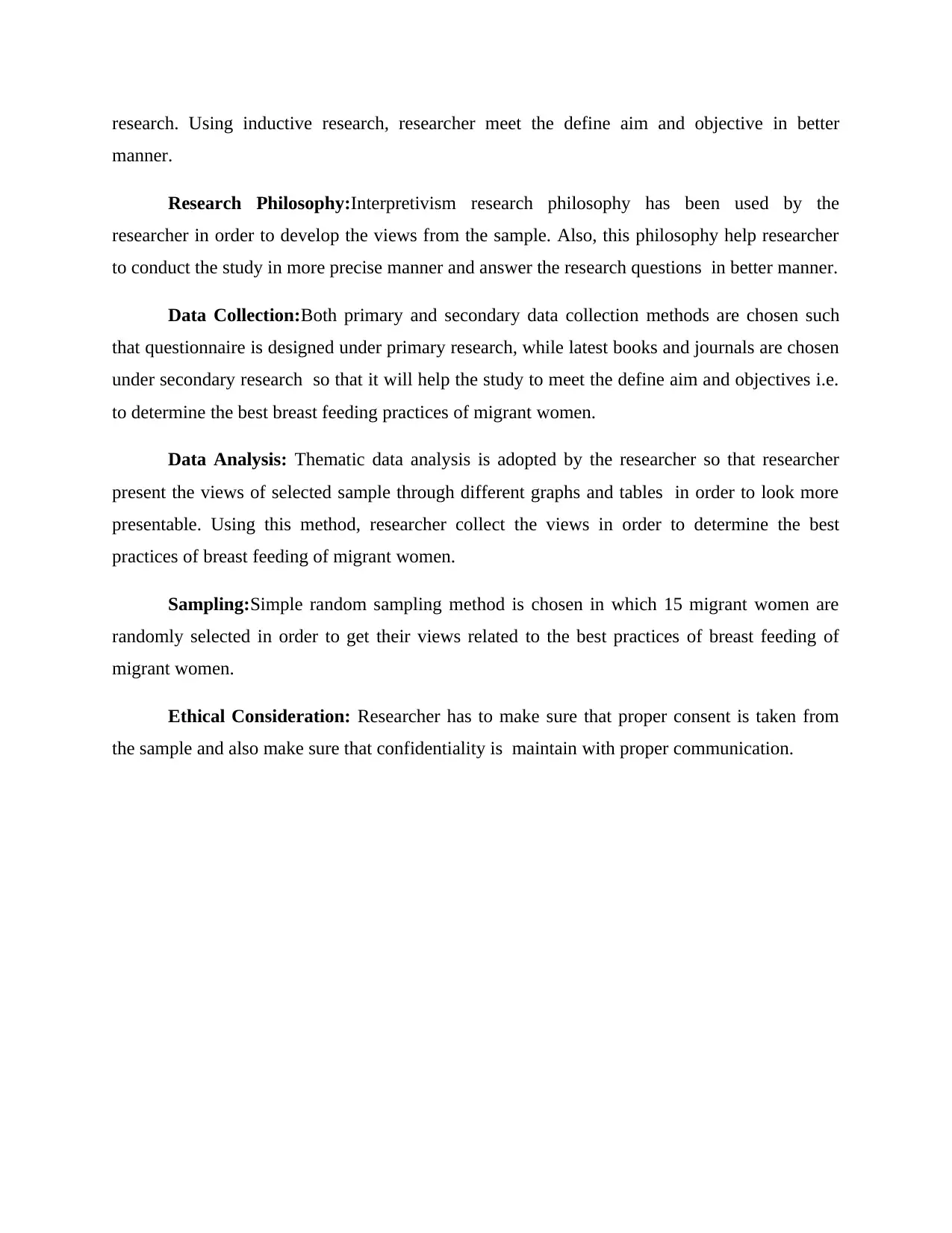
research. Using inductive research, researcher meet the define aim and objective in better
manner.
Research Philosophy:Interpretivism research philosophy has been used by the
researcher in order to develop the views from the sample. Also, this philosophy help researcher
to conduct the study in more precise manner and answer the research questions in better manner.
Data Collection:Both primary and secondary data collection methods are chosen such
that questionnaire is designed under primary research, while latest books and journals are chosen
under secondary research so that it will help the study to meet the define aim and objectives i.e.
to determine the best breast feeding practices of migrant women.
Data Analysis: Thematic data analysis is adopted by the researcher so that researcher
present the views of selected sample through different graphs and tables in order to look more
presentable. Using this method, researcher collect the views in order to determine the best
practices of breast feeding of migrant women.
Sampling:Simple random sampling method is chosen in which 15 migrant women are
randomly selected in order to get their views related to the best practices of breast feeding of
migrant women.
Ethical Consideration: Researcher has to make sure that proper consent is taken from
the sample and also make sure that confidentiality is maintain with proper communication.
manner.
Research Philosophy:Interpretivism research philosophy has been used by the
researcher in order to develop the views from the sample. Also, this philosophy help researcher
to conduct the study in more precise manner and answer the research questions in better manner.
Data Collection:Both primary and secondary data collection methods are chosen such
that questionnaire is designed under primary research, while latest books and journals are chosen
under secondary research so that it will help the study to meet the define aim and objectives i.e.
to determine the best breast feeding practices of migrant women.
Data Analysis: Thematic data analysis is adopted by the researcher so that researcher
present the views of selected sample through different graphs and tables in order to look more
presentable. Using this method, researcher collect the views in order to determine the best
practices of breast feeding of migrant women.
Sampling:Simple random sampling method is chosen in which 15 migrant women are
randomly selected in order to get their views related to the best practices of breast feeding of
migrant women.
Ethical Consideration: Researcher has to make sure that proper consent is taken from
the sample and also make sure that confidentiality is maintain with proper communication.
⊘ This is a preview!⊘
Do you want full access?
Subscribe today to unlock all pages.

Trusted by 1+ million students worldwide
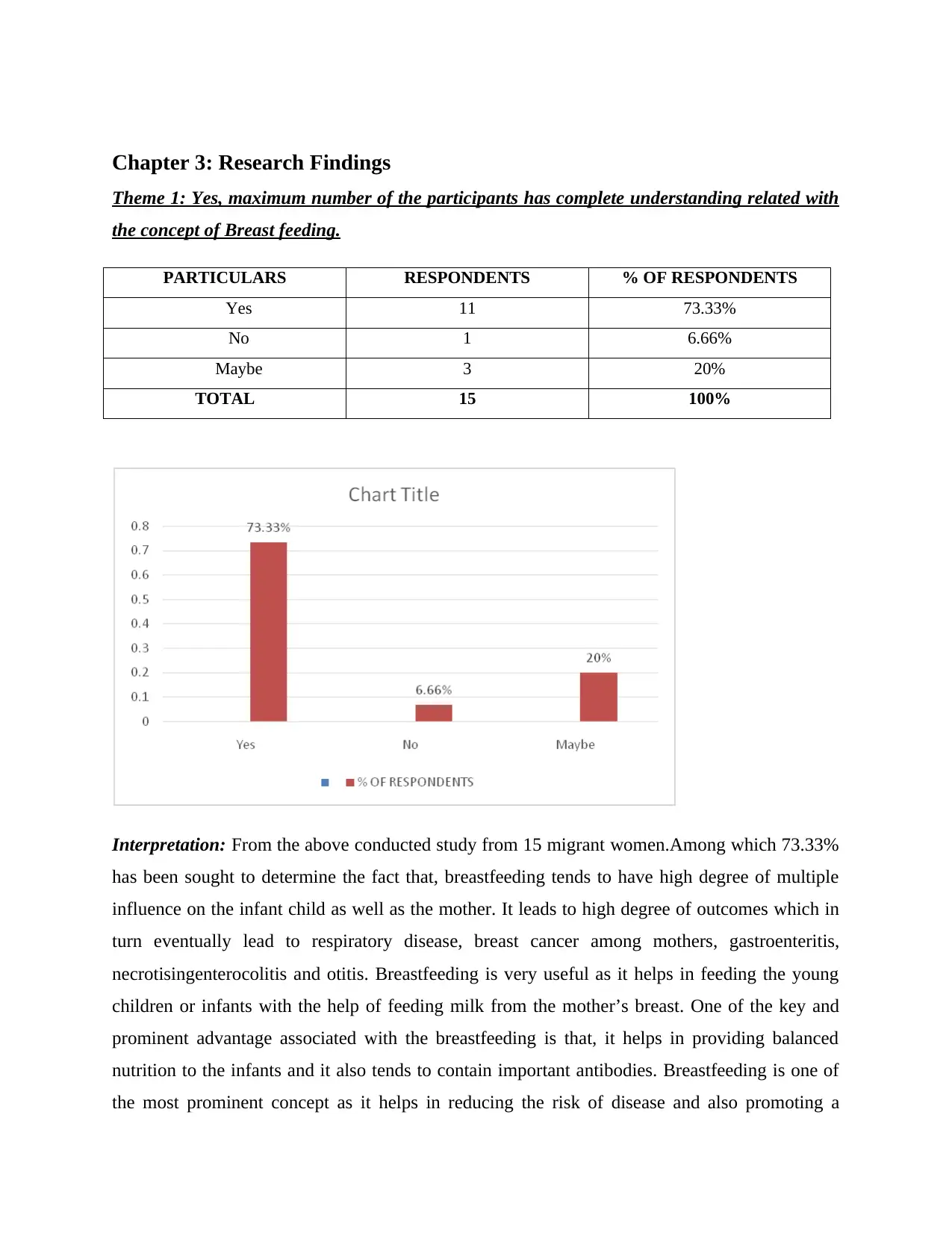
Chapter 3: Research Findings
Theme 1: Yes, maximum number of the participants has complete understanding related with
the concept of Breast feeding.
PARTICULARS RESPONDENTS % OF RESPONDENTS
Yes 11 73.33%
No 1 6.66%
Maybe 3 20%
TOTAL 15 100%
Interpretation: From the above conducted study from 15 migrant women.Among which 73.33%
has been sought to determine the fact that, breastfeeding tends to have high degree of multiple
influence on the infant child as well as the mother. It leads to high degree of outcomes which in
turn eventually lead to respiratory disease, breast cancer among mothers, gastroenteritis,
necrotisingenterocolitis and otitis. Breastfeeding is very useful as it helps in feeding the young
children or infants with the help of feeding milk from the mother’s breast. One of the key and
prominent advantage associated with the breastfeeding is that, it helps in providing balanced
nutrition to the infants and it also tends to contain important antibodies. Breastfeeding is one of
the most prominent concept as it helps in reducing the risk of disease and also promoting a
Theme 1: Yes, maximum number of the participants has complete understanding related with
the concept of Breast feeding.
PARTICULARS RESPONDENTS % OF RESPONDENTS
Yes 11 73.33%
No 1 6.66%
Maybe 3 20%
TOTAL 15 100%
Interpretation: From the above conducted study from 15 migrant women.Among which 73.33%
has been sought to determine the fact that, breastfeeding tends to have high degree of multiple
influence on the infant child as well as the mother. It leads to high degree of outcomes which in
turn eventually lead to respiratory disease, breast cancer among mothers, gastroenteritis,
necrotisingenterocolitis and otitis. Breastfeeding is very useful as it helps in feeding the young
children or infants with the help of feeding milk from the mother’s breast. One of the key and
prominent advantage associated with the breastfeeding is that, it helps in providing balanced
nutrition to the infants and it also tends to contain important antibodies. Breastfeeding is one of
the most prominent concept as it helps in reducing the risk of disease and also promoting a
Paraphrase This Document
Need a fresh take? Get an instant paraphrase of this document with our AI Paraphraser
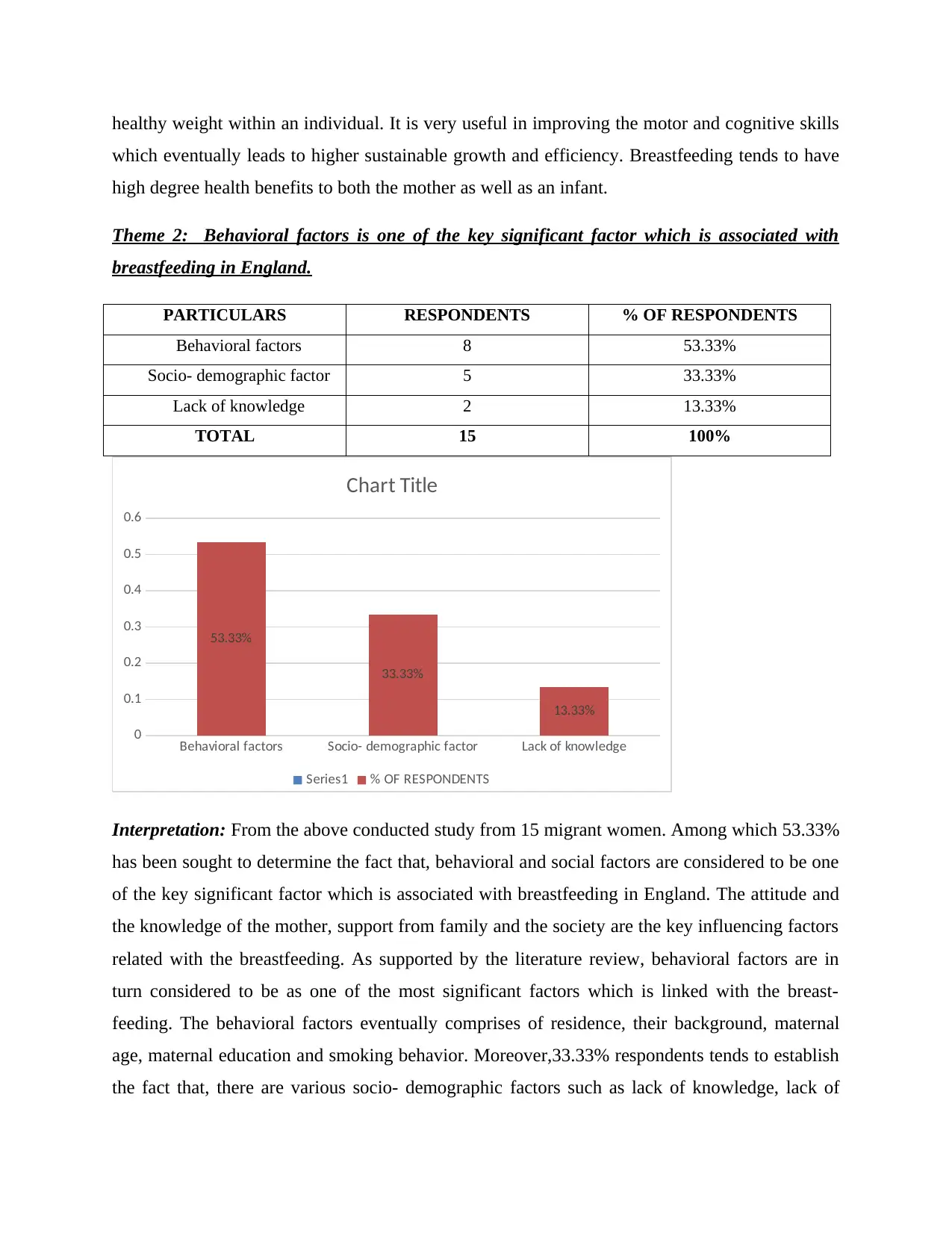
healthy weight within an individual. It is very useful in improving the motor and cognitive skills
which eventually leads to higher sustainable growth and efficiency. Breastfeeding tends to have
high degree health benefits to both the mother as well as an infant.
Theme 2: Behavioral factors is one of the key significant factor which is associated with
breastfeeding in England.
PARTICULARS RESPONDENTS % OF RESPONDENTS
Behavioral factors 8 53.33%
Socio- demographic factor 5 33.33%
Lack of knowledge 2 13.33%
TOTAL 15 100%
Behavioral factors Socio- demographic factor Lack of knowledge
0
0.1
0.2
0.3
0.4
0.5
0.6
53.33%
33.33%
13.33%
Chart Title
Series1 % OF RESPONDENTS
Interpretation: From the above conducted study from 15 migrant women. Among which 53.33%
has been sought to determine the fact that, behavioral and social factors are considered to be one
of the key significant factor which is associated with breastfeeding in England. The attitude and
the knowledge of the mother, support from family and the society are the key influencing factors
related with the breastfeeding. As supported by the literature review, behavioral factors are in
turn considered to be as one of the most significant factors which is linked with the breast-
feeding. The behavioral factors eventually comprises of residence, their background, maternal
age, maternal education and smoking behavior. Moreover,33.33% respondents tends to establish
the fact that, there are various socio- demographic factors such as lack of knowledge, lack of
which eventually leads to higher sustainable growth and efficiency. Breastfeeding tends to have
high degree health benefits to both the mother as well as an infant.
Theme 2: Behavioral factors is one of the key significant factor which is associated with
breastfeeding in England.
PARTICULARS RESPONDENTS % OF RESPONDENTS
Behavioral factors 8 53.33%
Socio- demographic factor 5 33.33%
Lack of knowledge 2 13.33%
TOTAL 15 100%
Behavioral factors Socio- demographic factor Lack of knowledge
0
0.1
0.2
0.3
0.4
0.5
0.6
53.33%
33.33%
13.33%
Chart Title
Series1 % OF RESPONDENTS
Interpretation: From the above conducted study from 15 migrant women. Among which 53.33%
has been sought to determine the fact that, behavioral and social factors are considered to be one
of the key significant factor which is associated with breastfeeding in England. The attitude and
the knowledge of the mother, support from family and the society are the key influencing factors
related with the breastfeeding. As supported by the literature review, behavioral factors are in
turn considered to be as one of the most significant factors which is linked with the breast-
feeding. The behavioral factors eventually comprises of residence, their background, maternal
age, maternal education and smoking behavior. Moreover,33.33% respondents tends to establish
the fact that, there are various socio- demographic factors such as lack of knowledge, lack of
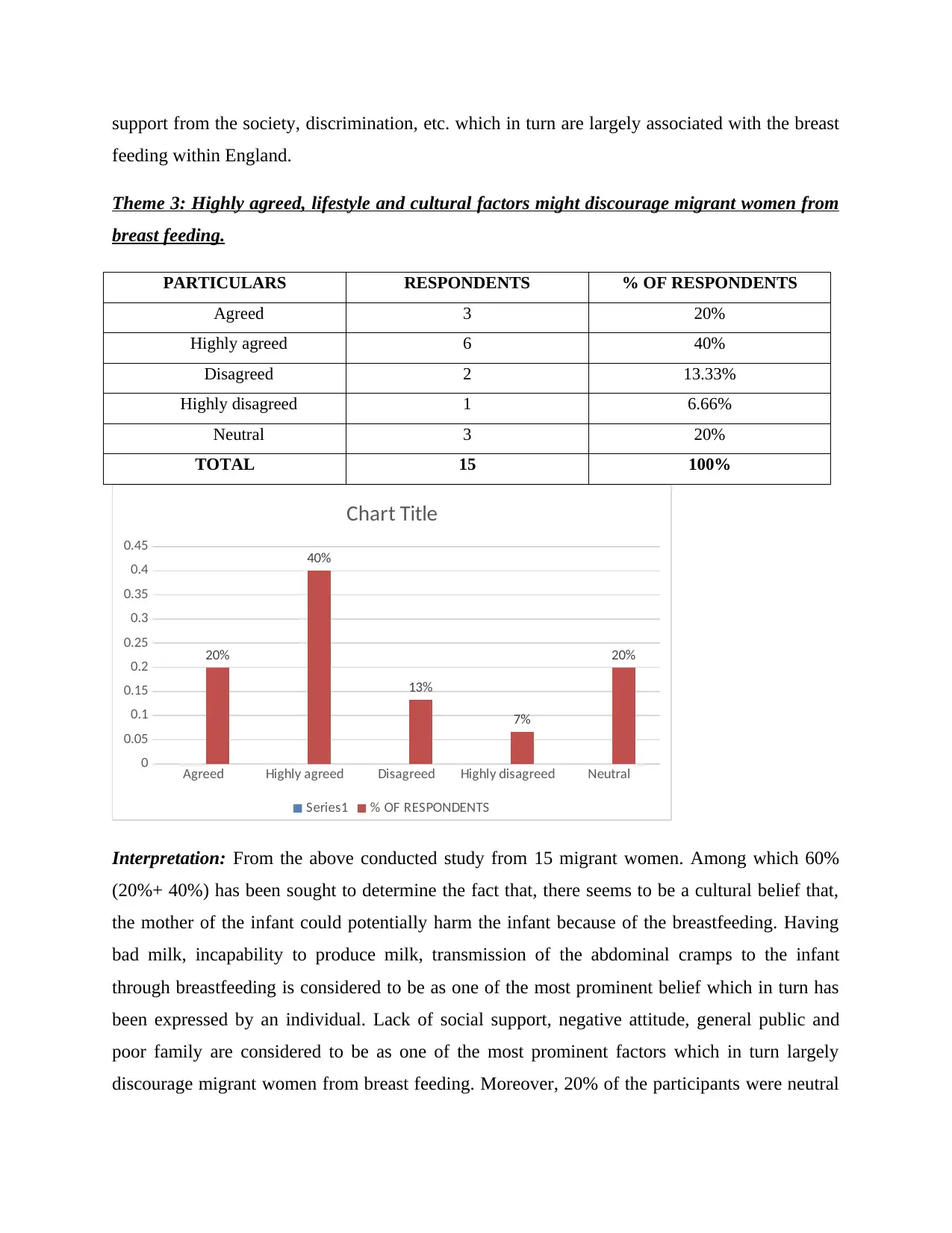
support from the society, discrimination, etc. which in turn are largely associated with the breast
feeding within England.
Theme 3: Highly agreed, lifestyle and cultural factors might discourage migrant women from
breast feeding.
PARTICULARS RESPONDENTS % OF RESPONDENTS
Agreed 3 20%
Highly agreed 6 40%
Disagreed 2 13.33%
Highly disagreed 1 6.66%
Neutral 3 20%
TOTAL 15 100%
Agreed Highly agreed Disagreed Highly disagreed Neutral
0
0.05
0.1
0.15
0.2
0.25
0.3
0.35
0.4
0.45
20%
40%
13%
7%
20%
Chart Title
Series1 % OF RESPONDENTS
Interpretation: From the above conducted study from 15 migrant women. Among which 60%
(20%+ 40%) has been sought to determine the fact that, there seems to be a cultural belief that,
the mother of the infant could potentially harm the infant because of the breastfeeding. Having
bad milk, incapability to produce milk, transmission of the abdominal cramps to the infant
through breastfeeding is considered to be as one of the most prominent belief which in turn has
been expressed by an individual. Lack of social support, negative attitude, general public and
poor family are considered to be as one of the most prominent factors which in turn largely
discourage migrant women from breast feeding. Moreover, 20% of the participants were neutral
feeding within England.
Theme 3: Highly agreed, lifestyle and cultural factors might discourage migrant women from
breast feeding.
PARTICULARS RESPONDENTS % OF RESPONDENTS
Agreed 3 20%
Highly agreed 6 40%
Disagreed 2 13.33%
Highly disagreed 1 6.66%
Neutral 3 20%
TOTAL 15 100%
Agreed Highly agreed Disagreed Highly disagreed Neutral
0
0.05
0.1
0.15
0.2
0.25
0.3
0.35
0.4
0.45
20%
40%
13%
7%
20%
Chart Title
Series1 % OF RESPONDENTS
Interpretation: From the above conducted study from 15 migrant women. Among which 60%
(20%+ 40%) has been sought to determine the fact that, there seems to be a cultural belief that,
the mother of the infant could potentially harm the infant because of the breastfeeding. Having
bad milk, incapability to produce milk, transmission of the abdominal cramps to the infant
through breastfeeding is considered to be as one of the most prominent belief which in turn has
been expressed by an individual. Lack of social support, negative attitude, general public and
poor family are considered to be as one of the most prominent factors which in turn largely
discourage migrant women from breast feeding. Moreover, 20% of the participants were neutral
⊘ This is a preview!⊘
Do you want full access?
Subscribe today to unlock all pages.

Trusted by 1+ million students worldwide
1 out of 32
Related Documents
Your All-in-One AI-Powered Toolkit for Academic Success.
+13062052269
info@desklib.com
Available 24*7 on WhatsApp / Email
![[object Object]](/_next/static/media/star-bottom.7253800d.svg)
Unlock your academic potential
Copyright © 2020–2026 A2Z Services. All Rights Reserved. Developed and managed by ZUCOL.





